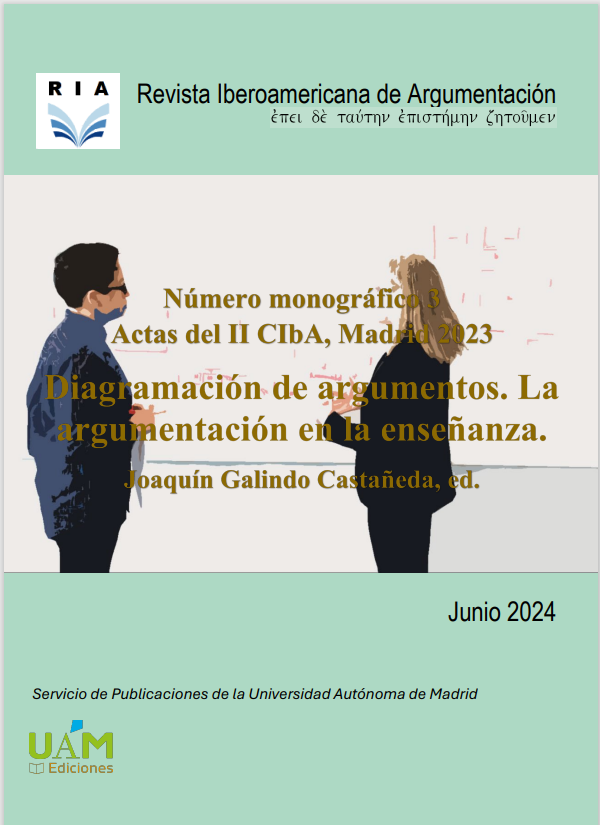Reasoning Together in Science Education: Covid-19 Vaccine Hesitancy as a Socio-Cognitive-Emotional Controversy
Keywords:
argumentation, emotions, collective reasoning, science education, socio-scientific controversy, vaccine hesitancyCopyright (c) 2024 Revista Iberoamericana de Argumentación

This work is licensed under a Creative Commons Attribution-NonCommercial-NoDerivatives 4.0 International License.
Abstract
Argumentative skills are targeted in science education both as part of scientific enculturation (e.g. Von Aufschnaiter et al., 2008) and to help citizens make decisions in our contemporaneous societies driven by technoscience (Coulon, Lascoumes, Barthe, 2001). What matters is to foster high-quality argumentation about socioscientific controversies about which various rational, though contradictory, viewpoints emerge, based on distinct hierarchization of priorities (Polo, 2023). This chapter propose a model to apprehend such issues taking into account their triple, socio-cognitive-emotional nature. The case of Covid-19 vaccine hesitancy in France in 2021-2022 is then elaborated to illustrate the practical significance of such model. Thanks to an education-focused analysis of the public debate, I specify principles of instructional design aiming at exploring socioscientific controversies.
Downloads
References
Albe, V. (2009). Enseigner des controverses. Rennes: Presses universitaires de Rennes.
Albe, V. (2006). Procédés discursifs et rôles sociaux d’élèves en groupes de discussion sur une controverse socio-scientifique. Revue française de pédagogie, 157, 103 118.
Asterhan, C. S. C. (2013). Epistemic and interpersonal dimensions of peer argumentation. In M. Baker, S. Järvelä, & J. Andriessen, (dir.) Affective Learning Together (p. 251-271). Routledge.
Bajos, N., Spire, A., Silberzan, L., & EPICOV Study Group. (2022). The social specificities of hostility toward vaccination against Covid-19 in France. PLoS One, 17(1), e0262192.
Baker, S. Järvelä, & J. Andriessen (Eds) (2013) Affective Learning Together. Routledge.
Bunt, H. (2011). Multifunctionality in dialogue. Computer Speech & Language, 25(2), 222-245.
Callon, M., Lascoumes, P., & Barthe, Y. (2001). Agir dans un monde incertain?: essai sur la démocratie technique. Paris: E?ditions du Seuil.
Driver, R., Newton, P., & Osborne, J. (2000). Establishing the norms of scientific argumentation in classrooms. Science education, 84(3), 287-312.
Dubé, E., Gagnon, D., Nickels, E., Jeram, S., & Schuster, M. (2014). Mapping vaccine hesitancy—Country-specific characteristics of a global phenomenon. Vaccine, 32(49), 6649-6654.
Fernández, M., Wegerif, R., Mercer, N., & Rojas-Drummond, S. (2002). Re-conceptualizing scaffolding and the zone of proximal development in the context of symmetrical collaborative learning. Journal of Classroom Interaction, 36(2/1), 40-54.
Galasso, V., Pons, V., Profeta, P., Becher, M., Brouard, S., & Foucault, M. (2022). From anti-vax intentions to vaccination: Panel and experimental evidence from nine countries (No. w29741). National Bureau of Economic Research.
Graham, B. S. (2020). Rapid COVID-19 vaccine development. Science, 368(6494), 945-946.
Grize, J. B. (1990). Logique et langage. Ophrys.
Guerrini, J.-C. (2023), Conflitos de valores durante a pandemia. Estudo de tribunas, apelos coletivos e entrevistas na impresa escrita francesa (feveiro 20020-janeiro 2022). In Emediato Wander (Ed.) Interaçoes polémicas e violencia verbal emtemas sociais sensiveis, Campinas: Pontes.
Lazarus, J. V., Ratzan, S. C., Palayew, A., Gostin, L. O., Larson, H. J., Rabin, K., ... & El-Mohandes, A. (2021). A global survey of potential acceptance of a COVID-19 vaccine. Nature medicine, 27(2), 225-228.
Lemke, J. L. (1990). Talking science: Language, learning, and values. Ablex Publishing Corporation, Norwood, NJ.
Lewis, J. & Leach, J. (2006). Discussion of socio-scientific issues: The role of science knowledge. International Journal of Science Education, 28(11), 1267-1287.
MacDonald, N. E. (2015). Vaccine hesitancy: Definition, scope and determinants. Vaccine, 33(34), 4161–4164.
Mercer, N. (1996). The quality of talk in children’s collaborative activity in the classroom. Learning and instruction, 6(4), 359–377.
Mercer, N. & Sams, C. (2006). Teaching Children How to Use Language to Solve Maths Problems. Language and Education, 20(6), 507-528.
Oulton, C., Dillon, J., & Grace, M. M. (2004). Reconceptualizing the teaching of controversial issues. International Journal of Science Education, 26(4), 411–423.
Perelman, Ch. y Olbrecths-Tyteca, L. 1989. Tratado de la Argumentación. Gredos, Madrid, Traducción de Julia Sevilla.
Peretti-Watel P, Larson HJ, Ward JK, Schulz WS, Verger P. Vaccine hesitancy: clarifying a theoretical framework for an ambiguous notion. PLoS Curr. 2015; 7. https://doi.org/10.1371/currents.outbreaks.
Plantin, C. (2018). Dictionary of argumentation: an introduction to argumentation studies. College Publications.
Polo, C. (2023). El debate fértil. Explorar una controversia en la emoción. Bogotá: Aula de Humanidades.
- (2019). Gesture’s Contribution to Collective Metaphorical Thinking in a Community of Philosophical Inquiry. Studia UBB. Philosophia, 64 (3), 41-64.
Polo, C, Lund, K. (2021). Affective Dialoguing Together: Considering the Socio-Cognitivo-Emotional Nature of Collaborative Learning in the Analysis of Educational Interactions. Symposium Analysing Educational Dialogues: Integrative and Critical Perspectives, EARLI Conference, August, online.
Polo, C., Lund, K., Plantin, C., & Niccolai, G. P. (2016). Group emotions: The social and cognitive functions of emotions in argumentation. International Journal of Computer-Supported Collaborative Learning, 11, 123-156.
Razai, M. S., Oakeshott, P., Esmail, A., Wiysonge, C. S., Viswanath, K., & Mills, M. C. (2021). COVID-19 vaccine hesitancy: the five Cs to tackle behavioural and sociodemographic factors. Journal of the Royal Society of Medicine, 114(6), 295-298.
Salmon, D. A., Dudley, M. Z., Glanz, J. M., & Omer, S. B. (2015). Vaccine hesitancy: causes, consequences, and a call to action. Vaccine, 33, D66-D71.
Toulmin, S. E. (2003 [1958]). The uses of argument. Cambridge University Press.
Von Aufschnaiter, C., Erduran, S., Osborne, J., & Simon, S. (2008). Arguing to learn and learning to argue: Case studies of how students' argumentation relates to their scientific knowledge. Journal of Research in Science Teaching: The Official Journal of the National Association for Research in Science Teaching, 45(1), 101-131.
Wegerif, R., Littleton, K., Dawes, L., Mercer, N., & Rowe, D. (2004). Widening access to educational opportunities through teaching children how to reason together. Westminster Studies in Education, 27(2), 143 156.
